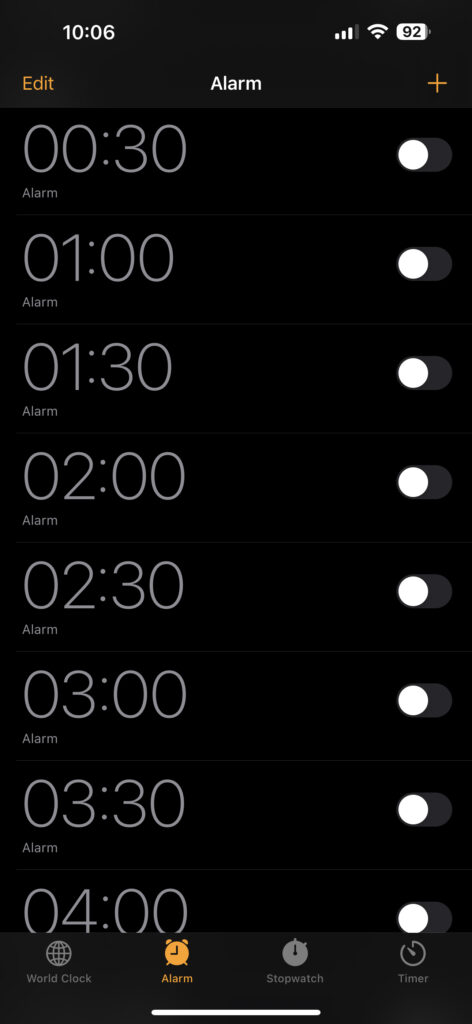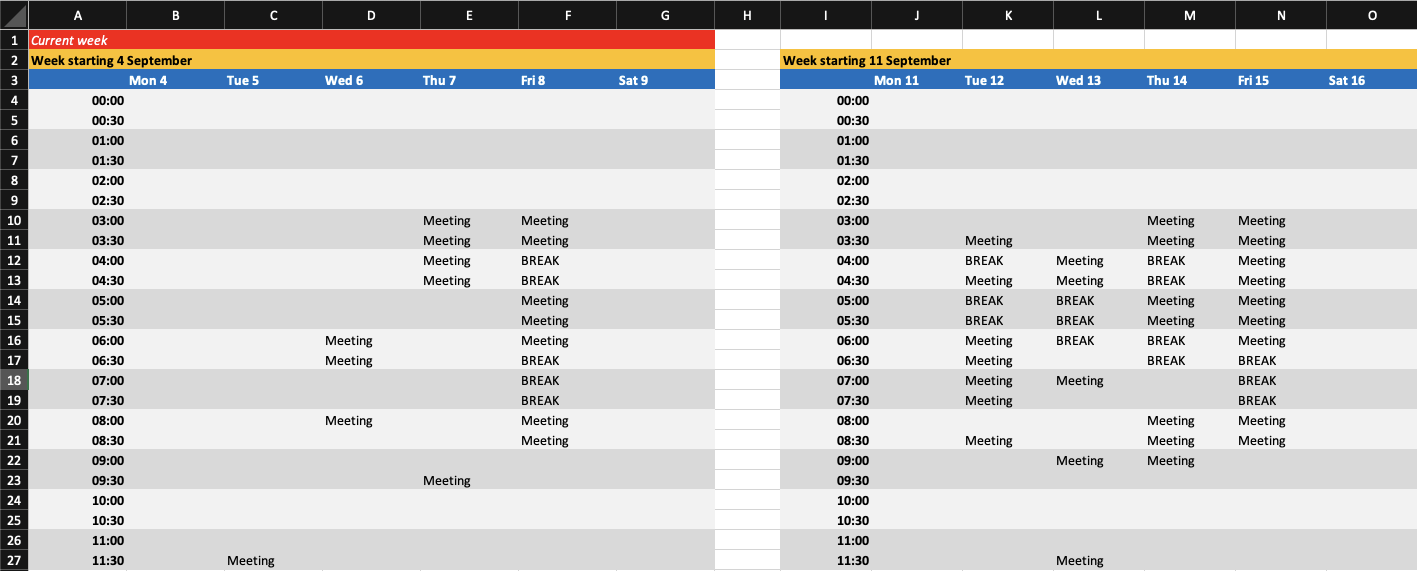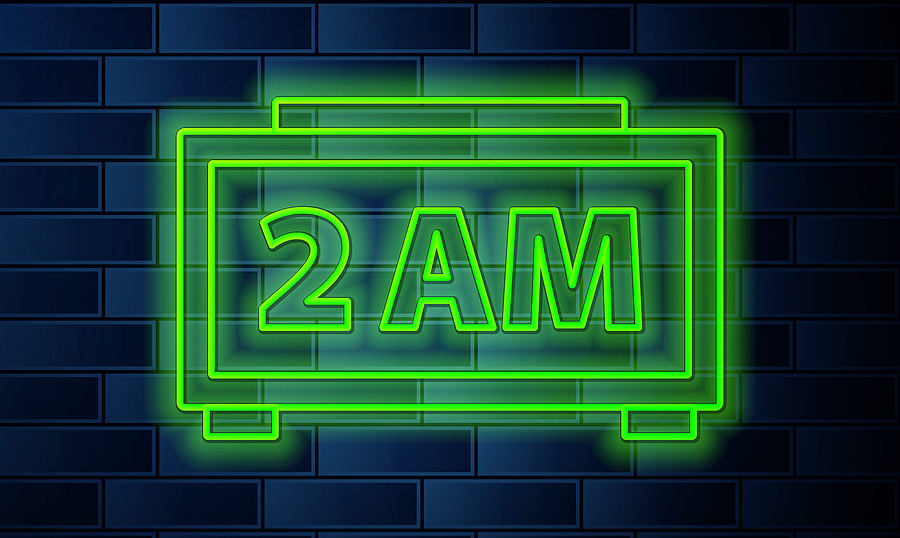Introduction
Whether you call it the hour of the wolf or the witching hour, that time between midnight and dawn is most commonly associated with sleep. (Or maybe, if you’re younger and more extroverted than I, partying hard.)
For me, as a product manager in a global team, that time is more often than not host to many meetings. To give you some context, here are my commonly used alarms:

I often have people remark to me that they don’t understand how I manage to get up for a 2am or 3am meeting. (Ironically, I sometimes check WorldTimeBuddy during a meeting within daylight hours for me and wonder how the hell someone in another timezone could still do a meeting and be compos mentis at 11pm at night.)
While some people do shift work regularly, and others do on-call work, remote work means there are more opportunities for people to find themselves working across multiple timezones, so I thought I might spend a few minutes imparting what I’ve learned about working in the hour of the wolf.
Be an early morning person
It’s been joked a couple of times that I must be a robot who doesn’t need my sleep. On the contrary, while I’ve always resented sleeping, I still need it. So the first lesson to working during this time is that you need to be an early morning person. Even before this role, a sleep-in for me was 5am.
Some people are naturally early morning people, and some are naturally night-owls. You can, I believe, train yourself to transition between these if you really want to – I was a complete night owl during my University days and would frequently watch the sun come up, but made the switch to being a morning person once I started working.
You can’t burn the candle at both ends. Staying up until midnight when you’ve got an alarm set to 1.30am (or indeed any early time) is a recipe for madness, so you do have to commit to the path of going to bed earlier if you’re getting up earlier.
Defend your rest time
I genuinely don’t care who books a meeting for me: I will not do a meeting between 7pm and midnight. And I’d need it to be a CEO-level meeting to do a meeting after 6pm. There are two reasons for this: everyone deserves downtime/everyone needs downtime to be functional. That’s the first reason. The second is even simpler: see the above point about ‘Be an early morning person’. You can’t burn the candle at both ends and expect to function: after about 8pm I’m dead on my feet.
Be Prepared
If you live by yourself, this probably isn’t as much of a concern. But if you have a family or live with others, you want to be able to get ready to work, and function while working early without making noise for the rest of your household.
For me, that means:
- Preparing a thermos of cold drink before I go to bed. It’s not the same as getting something straight out of the fridge, but it means I can have a cold drink while I’m in those meetings without disturbing the rest of the house.
- Having a coffee machine in my office. We have a full auto espresso machine in the kitchen but it’s (a) loud and (b) upstairs from my office space – neither of which is conducive to quiet times. So I reluctantly accepted the need for a pod-based coffee machine so I can make myself a coffee during those times.
- Have protein bars handy: I can sometimes find myself doing two or more hours of back to back meetings before 5am. It’s useful to get some energy into the system but I don’t want to snack too much before breakfast. A 30gm protein bar can really hit the spot to give you a mid-‘morning’ boost.
If you have lots of back-to-back meetings, work out how you can have your breakfast before or during them. This is more of a challenge for me because we always have a cooked breakfast. So in situations where I’ve got 3-4 hours of back-to-backs starting at 2am, I’ll sometimes sneak upstairs to grab an omelette that was cooked the night before and make my way slowly through it during my first meeting or two. (Since I’m happy to eat such food cold, at least I’m not using the Microwave From Hell With Chirpy Noises That Accompany Every Button Press we seem to have ended up with in our kitchen. (LG, I’m looking at you.)
Take a break
At the end of each week, I look ahead through my calendar for next week and strategically add blocks/breaks for breakfast and exercise. For instance, I have a recurring one-hour team meeting at 3am Thursday mornings. Sometimes I’ll end up in a situation where I need to add other meetings in at 4am, but if I don’t, I’ll then block out 4am to 6am as “Breakfast+Exercise”.
The important thing is that as soon as you get a break in those early morning meetings, take the chance to step away from your desk and get some movement in. Getting up only to sit down and work within 30 minutes isn’t really all that natural (and a standing desk will only go so far to keeping you active during this time), so you really do want to make sure you take the time to go for a walk or do some other exercise.
Be Organised
You need to know before you finish up for the day what your morning start is going to be like. Set your alarm for the next day as soon as possible into the current day. (And remember if you get up for a meeting at 2am then the morning after you need to get up at 4am: wait until after 4am before setting your alarm again. I’ve jumped out of my skin from loud alarms going off during a meeting more than once before that one got cemented into my brain.)
If you need to coordinate times with other members of your household, work out a way to do it with minimum fuss. For my husband and I, I maintain a shared spreadsheet that has a tab for the current and next week, Monday – Saturday as columns, midnight to midday (as half hour blocks per row). At the start of every week I pull up my personal laptop beside my work laptop, open Outlook on my work laptop and open the spreadsheet on my personal laptop, and fill in blocks of time like this:

Why don’t I use a shared calendar? First, from a security perspective I can’t connect a personal account, and secondly, from a security perspective, meeting names might be confidential anyway. So it’s enough to map out when I’m in meetings, and when I’ve got hard breaks allocated. Which means if he’s wanting to plan a good time to get up so we can exercise or eat breakfast together, it’s simple. Once that’s updated at the start of the week, it’s easy enough for me to quickly jump into it and make adjustments during the week as new meetings come in.
That organisation also helps me, too: if for some reason I do forget to set an alarm before I wrap up work for the day, I’m not forced to log into email to check my start time; I can just refer to the spreadsheet.
Don’t try to get up 5 minutes before the meeting
I’m lucky enough that I have an ensuite for my bedroom/office – that definitely gives me an advantage. The first few times I did early morning meetings though I tried to get up 15 minutes before the meeting with the plan to go back to bed after. Maybe that works for some people, but not for me.
So I always get up half an hour before my meetings start. I shower and have time to down a complete coffee while booting my work machine, logging in and getting ready for the meeting.
Remember your time zone isn’t theirs
Periodically you’ll get up and get ready for a meeting only to log on and find out the meeting was cancelled at midnight while you were asleep. Take a deep breath. It wasn’t midnight for them when they cancelled it. If you haven’t started your coffee, consider going back to bed. If you’ve got another meeting after and there’s no point going back to bed, give yourself a bit more chill time before that next meeting.
There’s a difference between a 15 hour day and a 15 hour day
There is always more work to be done than there are hours in the day. While it’s best to avoid a situation where you your day starts at 2am and you still have meetings at 4pm or 5pm, sometimes it might happen. In those circumstances it’s important to take time out in the day to give yourself a break. Take a longer lunch. Sit outside with a coffee for half an hour during a mid-morning break. Just don’t work non-stop across that entire period unless you’re in the mood for burnout.
Know when to stop the caffeine
If you’ve got early morning starts multiple days in a row, know when your body needs you to ease up on caffeine. I’ve got a high caffeine tolerance, but if I have to start at 4am or earlier tomorrow, I’ll stop drinking coffee (or at least caffeinated coffee) by 2pm in the afternoon to give it time to leave my system.
Your results may vary depending on how much coffee you drink normally, but you should find that happy point and be rigorous with yourself on having a coffee-stop-time.
Don’t be harsh on yourself
Some days you might end up tired. Some days you might be frustrated with the early morning starts. Just remind yourself that this is OK and to be expected. If you try to bottle that frustration up when it happens, you’ll end up making it worse.
Be passionate about your job
The thing that makes all this easy is this: I’m passionate about what I’m getting to participate in. I think that’s one of the biggest keys to success: it’s far, far easier to be motivated to turn on your alarm for 1.30am when you genuinely enjoy what you get to do.
